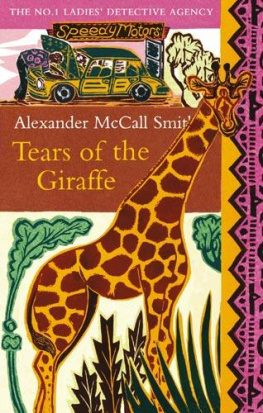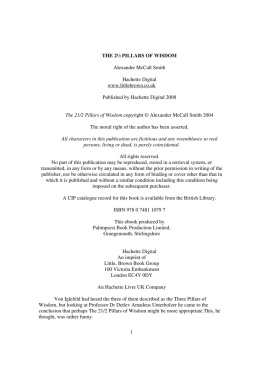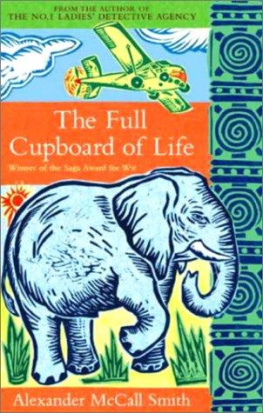Pantheon Books
New York
This is a work of ction. Names, characters, places, and incidents either are the product of the authors imagination or are used ctitiously. Any resemblance to actual persons, living or dead, events, or locales is entirely coincidental.
Copyright 2006 by Alexander McCall Smith All rights reserved. Published in the United States by Pantheon Books, a division of Random House, Inc., New York. Published simultaneously in Canada by Alfred A. Knopf Canada, a division of Random House of Canada Limited, Toronto. Originally published in Great Britain by Polygon, an imprint of Birlinn, Ltd., Edinburgh.
Pantheon Books and colophon are registered trademarks of Random House, Inc.
Library of Congress Cataloging-in-Publication Data McCall Smith, Alexander, [date] Blue shoes and happiness / Alexander McCall Smith. p. cm.(The No. Ladies Detective Agency series)
eISBN-13: 978-0-375-42426-7 eISBN-10: 0-375-42426-1
. Ramotswe, Precious (Fictitious character)Fiction. . No. Ladies Detective Agency (Imaginary organization)Fiction. . Women private investigatorsBotswanaFiction. . BotswanaFiction. I. Title. pr6063 . c326b58 2006 823 '. dc 22 2005052122
www.pantheonbooks.com
v1.0
CHAPTER SIX
HOW TO DEAL WITH AN ANGRY OSTRICH
T HE ARRIVAL OF Mma Ramotswe and Mma Makutsi at Mokolodi Game Reserve would normally be an occasion for the barking of dogs and for laughter and the shaking of hands. Mma Ramotswe was known hereher fathers brother, her senior uncle, was also the uncle (by a second marriage) to the workshop supervisor. And if that were not enough, Mr J.L.B. Matekonis cousins daughter worked in the kitchen at the restaurant. So it was in Botswana, almost everywhere; ties of kinship, no matter how attenuated by distance or time, linked one person to another, weaving across the country a human blanket of love and commu nity. And in the bres of that blanket there were threads of obli gation that meant that one could not ignore the claims of others. Nobody should starve; nobody should feel that they were out siders; nobody should be alone in their sadness.
Now, though, there was nobody on duty at the gate, and they drove in quietly. They parked near an acacia tree. Several people had already had the same idea, as shade was always sought after, and cars competed with one another to nd relief from the sun. The tiny white van, by virtue of its size, was able to nose into a space between two large vehicles, leaving just enough room for Mma Ramotswe to get out of her door and, by breathing in, to squeeze through the space between the van and the neighbouring vehicle. It was a tight squeeze, and it brought back to her the subject of her earlier conversation with Mma Makutsi. If she went on a diet, there would be fewer occasions like this where she would nd that the passages and doorways of this world were uncomfortably narrow for a person of traditional build. For a moment she was stuck, and Mma Makutsi was poised to render help, but then with a nal push she was free.
People should think a bit more of others when they park their cars, said Mma Ramotswe. There is enough room in Botswana for everybodys car. There is no need for all this crushing.
Mma Makutsi was about to say something, but did not. Mma Ramotswe had chosen that spot to park, and the owners of the two other cars might well take the view that she, not they, was the cause of the crush. She did not say this, though, but smiled in a way that could have signalled agreement or merely polite tol erance. Mma Ramotswes views were, in general, very balanced, and Mma Makutsi found no difculty in agreeing with them. But she had discovered that when it came to any matter con nected with the tiny white van, then her otherwise equable employer could become quite touchy. As she stood and watched Mma Ramotswe squeezing herself through the gap between the vehicles, she remembered how a few weeks ago she had asked Mma Ramotswe how two large scratches and a dent had appeared on the side of her van. She had been surprised by the vigour with which Mma Ramotswe denied the evidence.
There is nothing wrong with my van, she said. There is nothing wrong.
But there is a big scratch here, said Mma Makutsi. And another one here. And a dent. Look. There it is. I am putting my nger on it. Look.
Mma Ramotswe glanced in a cursory way at the side of the van and shook her head. That is nothing, she said dismissively. That is just a bang that happened.
Mma Makutsi had shown her surprise. A bang?
Yes, said Mma Ramotswe. A bang. It is not a big thing. I was parking the van in town and there was a post. It had no business being there. Somebody had put this post in the wrong place and it hit the side of the van. There was a little bang. That is all.
Mma Makutsi bit her lip. Posts did not move; vans moved. But a warning glance from Mma Ramotswe told her that it would be unwise to pursue the matter further, and she had not. Now at Mokolodi, as then, she thought that it would be best not to say anything on the subject of parking or vans in general, and so they walked together in silence towards the ofce. A woman came out to greet them, a woman who appeared to recognise Mma Ramotswe.
He is expecting you, Mma, said the woman. Your anc telephoned to tell us that you were coming.
He is my husband now, said Mma Ramotswe, smiling.
Oh! exclaimed the woman. That is very good. You must be very happy, Mma. He is a good man, Mr L.J.B. Matekoni.
J.L.B., corrected Mma Ramotswe. He is Mr J.L.B. Mate koni, and thank you, Mma. He is a very good man.
I would like to nd a man like that, said the woman. I have a husband down in Lobatse. He never comes to see me. And when I go down there, he is never in.
Mma Ramotswe made a clucking sound of sympathy, and disapprovalsympathy for the woman in her plight, and disap proval of what she thought was only-too-common masculine behaviour. There were many good men in Botswana, but there were some who seemed to think that their women were only there to atter them and give them a good time when they felt in need. These men did not think of what women themselves needed, which was comfort and support, and a bit of help in the hundred and one tasks which women had to perform if homes were to be kept going. Who did the cooking? Who kept the yard tidy? Who washed and fed the children and put them to bed at night? Who weeded the elds? Women did all these things, and it would be nice, thought Mma Ramotswe, if men could occasionally lend a hand.
It was particularly hard for women now, when there were so many children left without parents because of this cruel sickness. These children had to be looked after by somebody, and this task usually fell to the grandmothers. But in many cases the grand mothers were nding it difcult to cope because there were sim ply so many children coming to them. Mma Ramotswe had met one woman who had been looking after twelve grandchildren, all orphaned. And there this woman was at seventy-ve, at a time when a person should be allowed to sit in the sun and look up at the sky, cooking and washing and scraping around for food for the hungry mouths of all those children. And if that grandmother should become late, she thought, what then?
The woman led them back towards the ofce, a round build ing, made of stone, with a thatched roof that came down in low eaves. A man stepped from the door, looked momentarily sur prised when he saw Mma Ramotswe and Mma Makutsi, and then gave a broad grin.
Dumela, Mma Ramotswe, he said, raising a hand in greet ing. And Mma...
This is Mma Makutsi, Neil, said Mma Ramotswe.
Of course, said Neil. This is the lady who keeps cobras under her desk!
Mma Makutsi laughed. I do not wish to think about cobras, Rra, she said. I am only glad that you came when you did. I do not like snakes.











